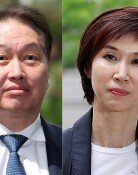[Editorial] Lessons to be Learned From the APEC Summit
[Editorial] Lessons to be Learned From the APEC Summit
Posted November. 19, 2005 08:21,
President Roh Moo-hyun said yesterday at the APEC summit that more efforts are required to meet the APECs ultimate goal of creating an economic community, and trade and investment barriers must be reduced to strengthen an open, multilateral trade system.
No one would dispute that Korea, as an exporter of manufactured goods, would benefit from multilateral free trade.
The latest APEC meeting laid the foundation to facilitate the deadlocked Doha Development Agenda (DDA) negotiations as the 21 APEC member countries agreed to abolish agricultural subsidies of industrialized nations by 2010 and opened the door for multilateral talks. Even in bilateral negotiations, China and Russia were recognized as market economies, which opened up the opportunity for trade expansion, and the dispute over kimchi and quotas for Alaskan pollack were also smoothly resolved. Concrete results are also anticipated in FTA negotiations with ASEAN countries, including Malaysia and Thailand.
Little progress was seen on FTA talks with the U.S. and Japan. The controversy over screen quotas held back Korean-U.S. trade cooperation. Reportedly, there were no further discussions on the free trade pact with Japan.
Trade cooperation with the economic superpowers, U.S. and Japan, needs to be further strengthened for security, as well as to enhance competitiveness.
There also were many critical comments about the Korean investment climate and commitment to liberalization. Foreign businessmen criticized excessive intervention from civic groups, the National Assembly, and the government, while calling for deregulation and transparency. United States Trade Representative Robert Portman also urged a prompt decision on the rice negotiations now being considered in the National Assembly.
This comes as poignant remarks questioning how we can expect a free trade agreement when something as basic as the rice negotiation decision has yet to clear.
Korea is expected to exceed $500 billion in trade volume this year alone. Todays prosperity has been achieved through an increase in trade. Nevertheless, strong resistance to the market opening remains within the country. Even government bodies such as Ministry of Agriculture and Forestry and the Ministry of Maritime Affairs and Fisheries also opposed the Ministry of Commerce, Industry, and Energys plan for additional trade liberalization, causing ministerial conflicts.
Trade and investment expansion is vital to Koreas interests. Taking this APEC meeting as an opportunity, the government must display a firm position on liberalization and pursue consistent policies. Countermeasures should be taken for the negatively affected agricultural sector, and a public consensus should be reached on the opening of the Korean market.




![[단독]통일교 ‘한학자 보고문건’에 ‘전재수’ 최소 7번 등장](https://dimg.donga.com/c/138/175/90/1/wps/NEWS/IMAGE/2025/12/22/133015670.1.jpg)


